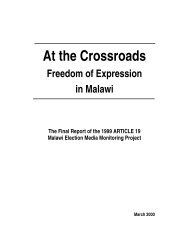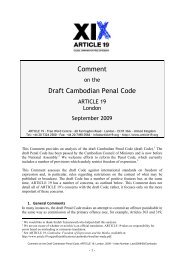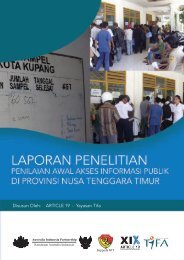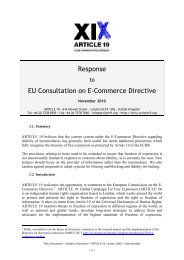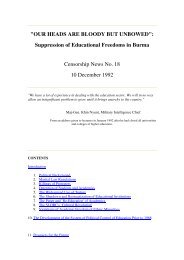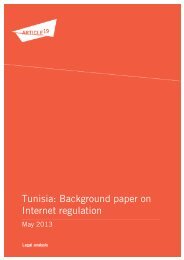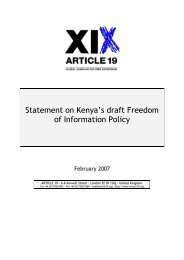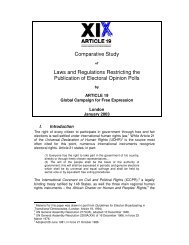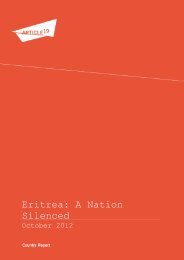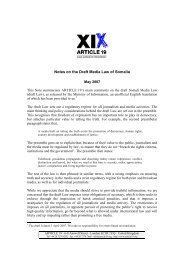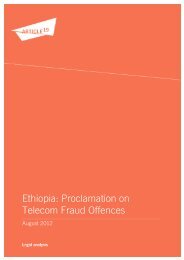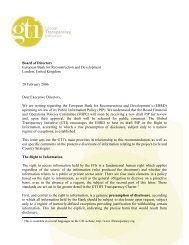Response to DPP Social Media Consultation - Article 19
Response to DPP Social Media Consultation - Article 19
Response to DPP Social Media Consultation - Article 19
Create successful ePaper yourself
Turn your PDF publications into a flip-book with our unique Google optimized e-Paper software.
parte Rusbridger [2003] UKHL 38 at para 40: "No At<strong>to</strong>rney General or Direc<strong>to</strong>r of PublicProsecutions would or could authorise a prosecution [under section 3 of the Treason Felony Act1848] for [peacefully advocating the abolition of the monarchy] without becoming a laughing s<strong>to</strong>ck".Similarly, when Parliament considered whether or not <strong>to</strong> abolish the offence of blasphemy, it wasnoted that there had not been a public prosecution for blasphemy since <strong>19</strong>22 (see House ofCommons Library, The Abolition of Blasphemy Offences, SN/PC/04597, 9 May 2008, at page 18).The Criminal Justice and Immigration Act 2008 subsequently abolished the offence of blasphemy in2008. Similarly, there were very few prosecutions in the last century for sedition until the offencewas abolished in 2010 (see Hansard, 9 july 2009, Column 844).If, contrary <strong>to</strong> our recommendation, prosecu<strong>to</strong>rs continue <strong>to</strong> enforce the above provisions, ARTICLE<strong>19</strong> agrees that the threshold for such prosecutions should be a very high one. While the explanationcontained in paragraphs 30 <strong>to</strong> 36 goes some way <strong>to</strong>wards clarifying what that may entail, we remainconcerned that: (1) ‘grossly offensive’, ‘indecent’ and ‘obscene’ are eminently subjective terms whichcan be interpreted in any number of different ways; and (2) it is equally unclear what “more than”grossly offensive, obscene etc means. In other words, the threshold for category 4 communicationsprosecution still lacks foreseeability.It would therefore be helpful if the guidance could provide practical examples of the types ofcircumstances in which a social media user may be prosecuted for category 4-types ofcommunications. We further draw attention <strong>to</strong> the Twitter Help Centre’s guidance on offensivecomments, which provides further additional elements that prosecu<strong>to</strong>rs should consider whenexamining category 4-type of communications, such as the timeline of tweets:https://support.twitter.com/articles/20170133-offensive-content-consider-the-context.3. Do you agree with the public interest fac<strong>to</strong>rs set out in paragraph 39?ARTICLE <strong>19</strong> welcomes the attempt <strong>to</strong> identify circumstances in which a prosecution is unlikely <strong>to</strong> benecessary and proportionate. We broadly support the public interest fac<strong>to</strong>rs set out in paragraph 39.We do, however, have serious reservations about criteria 39 (a) and (b), which in our view could havean inadvertent chilling effect on freedom of expression. In particular, criterion 39 (a) couldencourage self-censorship of social media users as long as it remains unclear what ‘more than’grossly offensive, obscene etc. communications means. The law should not give incentives <strong>to</strong> people<strong>to</strong> apologise or retract what they may legitimately express under the law.Similarly, criterion 39 (b) could have the effect of encouraging service providers such as Facebook <strong>to</strong>remove perfectly legitimate - albeit distasteful - comments, when they feel there may be a risk ofprosecution against their users. This is particularly important given that intermediaries are likely <strong>to</strong>be the first port of call for any complaint or enforcement action. It is also unclear how such ‘swiftand effective action’ would take place. In particular, we are concerned that this may be interpretedas giving a licence <strong>to</strong> police and prosecu<strong>to</strong>rs <strong>to</strong> request intermediaries and social media platforms(such as Facebook or Twitter) <strong>to</strong> remove communications which are distasteful or obnoxious but fallbelow the threshold for prosecution.In relation <strong>to</strong> criterion 39(c), while we strongly support the general thrust of this provision, theconcept of an 'obvious consequence of sending the communication' is problematic. As we noted inour answer <strong>to</strong> question 1, the nature of modern communications makes it very easily <strong>to</strong> link, forwardor repost messages intended for a narrow audience <strong>to</strong> the world at large. To impose criminalsanctions upon the original author of a message on this basis alone would, in our view, breach both7



